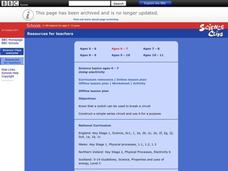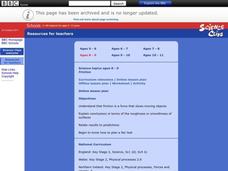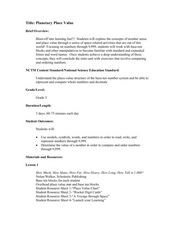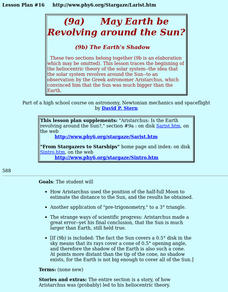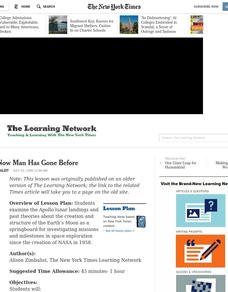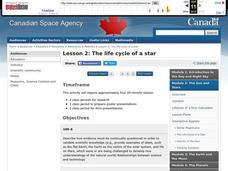Curated OER
Reversible and irreversible changes
Students experiment with solids and liquids to find which solids will dissolve in water. This dissolution and mixtures lesson can be completed online or in class as all materials are connected to the lesson plan for both settings.
Curated OER
Micro-Organisms
Students investigate micro-organisms with an on line activity. In this micro-organism on line lesson plan, students identify bacteria, viruses and fungi projected onto a white board. Students work in groups and use a computer and an on...
Curated OER
Using Electricity
Students read The Lighthouse Keeper's Lunch to become familiar with the way a lighthouse works.In this using electricity lesson, student create lighthouses with plasticine clay and a working circuit. Students complete a worksheet on...
Curated OER
Sorting and Using Materials
Young scholars explore materials and their properties. In this matter lesson, students identify objects and describe their properties. Young scholars test and sort materials using an interactive whiteboard, followed by a group discussion...
Curated OER
Friction
Students compare and contrast the movement of objects on different surfaces, experimenting with friction and forces of motion. This friction lesson has numerous online tools including worksheets and virtual activities; the option is also...
Curated OER
How We See Things
Students investigate how mirrors reflect light. In this reflection lesson, students draw the path of the light reflected from a mirror. Students construct a list of objects that are light sources.
Curated OER
Identifying Characteristics of Planets And Their Moon(s) Using an Internet Scavenger Hunt.
Students perform an internet scavenger hunt. They describe characteristics of each planet and their moon(s) and draw a diagram of the solar system and label the planets.
Curated OER
Planetary Place Value
Third graders explore place value to the ten thousands place. This incredibly thorough, 24-page lesson has learners construct, order, and compare numbers to 9,999. This three-day lesson includes reteaching and extension activities...
Curated OER
Does the Distance Between the Earth and Sun Cause the seasons?
Young scholars reflect upon the concepts of seasons. The concepts are taught using a variety of different teaching approaches. A activities lead to a reflection that will help students to make a cognitive transfer of information form...
Curated OER
Moon Observations
Students study the science of the moon. In this moon observations lesson, students study vocabulary associated with the moon, study a lunar calendar, and a phases of the moon's orbit around the Earth.
Curated OER
May The Earth Be Revolving Around The Sun?
Students trace the beginning of the heliocentric theory of the solar system--the idea that the solar system revolves around the Sun--to an observation by the Greek astronomer Aristarchus, which convinced him that the Sun was much bigger...
Curated OER
Our Planet Earth
Young scholars brainstorm and discuss cultural relevance of the moon to the Native American community. They utilize the internet to research items about the moon, use a digital camera to take pictures, and then write a report over what...
Curated OER
Observing and Sketching the Lunar Surface
Learners explore space science by conducting an illustration activity. In this lunar lesson plan, students discuss what the moon is and the role it plays for our environment on Earth. Learners view images of the moon and utilize chalk to...
Curated OER
Voyage: A Journey through our Solar System
Students build the Voyage scale model of the Solar System on a playground and "travel" to each planet. They recognize that the Sun and planets are tiny worlds in a vast space, giving them a new perspective on the Solar System, and...
Curated OER
World In Motion Curriculum
Young scholars explore the night sky and its solar system. Using a Digitarium planetarium system, students observe four constellations. They discover the phases of the moon and eclipses. Young scholars recognize the difference between...
Curated OER
Modeling the Big Bang and the Formation of the Universe
Sixth graders conduct an experiment to understand the Big Bang Theory. In this Big Bang Theory lesson, 6th graders will observe a balloon with confetti popping to emulate and analyze information related tot he Big Bang theory....
Curated OER
Timekeeping by the Sun
Students measure shadows to learn about the Sun-Earth relationship. In this astronomy lesson, students create a shadow stick of a Pokemon character and record measurements of its shadow in a data chart. Follow-up discussions guide...
Curated OER
Generating Power
Students construct a working model of a turbine and explain how water generates power. By the end of the lesson, they list the effects of Kingsley Dam on people, plans, and animals -- both positive and negative.
Curated OER
The Solar System: Go Green with the Sun!
Third graders learn how to use solar power. In this sun, technology and energy lesson, 3rd graders learn how the solar power from the sun can give off energy, learn about solar panels, discuss their uses and benefits, and design a...
Curated OER
Where Now Man Has Gone Before
Students examine the Apollo lunar landings and past theories about the creation and structure of the Earth's Moon as a springboard for investigating missions and milestones in space exploration since the creation of NASA in 1958.
Curated OER
Cosmic Wheels
Learners build a scale model of the Solar System and determine the time other planets take to travel around the Sun in comparison to the time of the Earth's revolution. The velocity of the planets are also determined in this lesson.
Curated OER
Planets in Proportion
Learners apply estimation strategies and proportional reasoning to determine a scale comparing the planetary bodies to Earth. They convert measurements of time and distance using scientific notation. Both the metric and customary units...
Curated OER
GPS Treasure Hunt for Knowledge
Students examine themselves as being part of a global community. In this global community lesson, students investigate GPS systems. Students gain knowledge on how the device works. Students discover that satellites provide information...
Curated OER
The Life Cycle of a Star
Young scholars investigate the life cycle of a star and make conclusions based on evidence, research, and observation. In this lesson on space and scientific investigation, students describe the relationships between science and...




